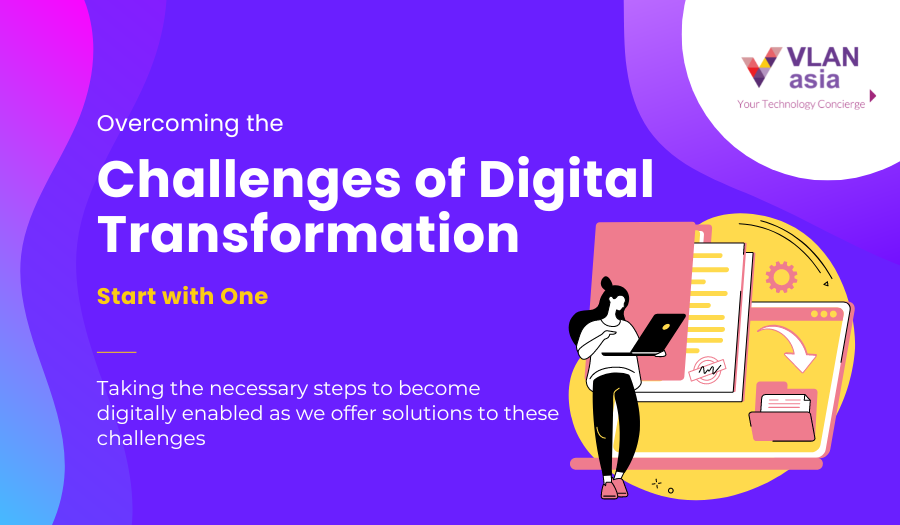Start with one: Overcoming the Challenges of Digital Transformation

The pandemic has reshaped the landscape, which will continue to encourage technological adoption and innovation. According to a Malaysian Reserve article, there is still a percentage of companies that are truly hesitant to digitalize due to multiple digital transformation barriers.
In conjunction with the #startwithONE initiative, VLAN Asia would like to discuss the challenges of digital transformation and suggests solutions for overcoming them. This initiative is about taking the first step toward your goal which is often the most difficult part of a new year’s resolution. We recommend setting small and attainable objectives and cultivating this into a habit that will eventually work towards achieving your goal.
What is digital transformation?
Digital transformation is the process of using digital technologies to fundamentally change how an organization operates and delivers value to its customers. While the benefits of digital transformation are clear, many organisations struggle with the challenges of implementing it.
Examples of digital transformation are:
- Adopting a remote workspace to reduce carbon footprint
- Storing files on a cloud system,
- Automating simple everyday tasks with artificial intelligence (AI) chatbot to serve customers
- AI-driven insights to do sales reporting
- Re-skilling employees
Jump to the Topic:
Challenges to Digitalisation- Resistance to change and the mindset of a leader
- Insufficient Funds for Technological Change
- Lack of a clear strategy
- Security Concerns
- Taking a holistic approach
- Craft a Comprehensive Digitalisation Strategy
- Solid implementation plan
- Investing in skills and expertise
- Strengthen your cybersecurity strategy
- Smart Budgeting during Implementation
Challenges of Digitalisation
Resistance to change and the mindset of a leader
The first pillar of digitisation is the leader's mindset, which is resistant to change because they are unaware about the benefits of using software to ease everyday task. Leaders who are unaware often regard digitalisation as a difficult and costly process.
Insufficient Funds for Technological Change
Companies that are tight on budget or experienced a loss during the pandemic may be more reluctant due to financial constraints. The truth is that introducing new digital solutions into practice is a costly process that demands significant investments which is not the case as there are plenty of flexible solutions catered to every business's needs.
Lack of a clear strategy
One of the biggest challenges of digital transformation is that many organisations don't have a clear understanding of what they want to achieve or how to achieve it. which can result in the ineffective implementation of digital solutions.
Security Concerns
The digital transformation also brings a new set of security and compliance risks. Organizations need to ensure that their digital transformation initiatives are compliant with relevant laws and regulations and that they have the necessary security controls in place to protect sensitive data.
Start with One: Take your first step to digitalisation
Taking a holistic approach
Looking at the organisation and its systems in a bigger picture to identify which processes, data and systems can be aided by digital solutions. This includes attending webinars, conducting research, consulting with employees and participating in workshops to boost their trust and understanding of digital technologies.
Craft a Comprehensive Digitalisation Strategy
For a clear digital transformation strategy, a clear plan that corresponds with the company’s strategy and is communicated to all stakeholders is essential. The strategy should outline the initiative's aims, objectives, and strategies. This plan should be evaluated and revised on a regular basis to guarantee its relevance and effectiveness.
Solid implementation plan
Before implementing digital solutions, ensure the digital vision is backed by a solid implementation plan. Your solution roadmap should support the business’s needs and ensure consistency across all areas of the organization. Create integration for scalable systems for growing enterprises, such as cybersecurity, cloud systems, analytics, sales, CRM, ticketing, and more, for effective and sustainable adoption.
For example, if you plan to improve business communication and store vast amounts of information like documents, claims and invoices, you could consider products such as Microsoft 365. Thinking to improve sales, marketing process and effectively manage customers? HubSpot has a bucket to offer. Need advance CRM and ticketing system? Zendesk is your answer and the list goes on.
Investing in skills and expertise
Build digital dexterity and upskill the workforce to ensure they possess the necessary skills and knowledge to shift digitally with ease. This, in turn, can act as a motivation factor for employees to strive better and improve their productivity. This can include sponsoring employees a boot camp or workshop to improve their skills and interest in areas such as technical skills, project management courses, data analysis, user experience or UX, cybersecurity, marketing and business development or strategist.
Strengthen your cybersecurity strategy
Digital transformation does not stop at one step but rather is a continuous improvement for cybersecurity. Always ensure a proactive strategy to tackle issues and continue to implement robust cybersecurity measures to protect your business’s sensitive data.
Smart Budgeting during Implementation
The success of digital transformation depends on effective budget management, which ensures the organisation has the sufficient resources it needs to implement it effectively. This involves prioritising essential investments, utilising existing resources, investing in scalable solutions, and seeking out cost-effective solutions.
Overcoming Digitalisation Challenges
Digitalisation is a complex and challenging process that requires a clear strategy, strong leadership, and a willingness to adapt. By addressing the common challenges and implementing the solutions outlined in this blog post, organisations can successfully overcome the challenges of digital transformation and reap the benefits of digitalisation.
Keen on taking your business’s digital transformation to the next level? We’d love to hear from you! (CTA to Contact us Page)
Related Articles
- Strategic Planning & Digitalisation of your business
- Digital Transformation: Business Automation is the New Norm
- A Roadmap to Digitalisation
- Can Microsoft Teams help Automate Stuff
- "Automation" Disruption or Progression? - Webinar Recap with Gard Inc
Lean on the Experts
Keen on digitising your business? Drop us a message and we would love to assist you!
Contact Us
Recent Articles

.jpg?height=200&name=Tribal%20Monthly%20The%20Future%20of%20Human-AI%20Synergy%20in%20Emotional%20Intelligence(2).jpg)
.jpg?height=200&name=Future%20Data%20Analysis%20Slides(3).jpg)
.jpg?height=200&name=ERP%20for%20Business%20Growth%20Make%20the%20right%20investment%2c%20at%20the%20right%20time(2).jpg)